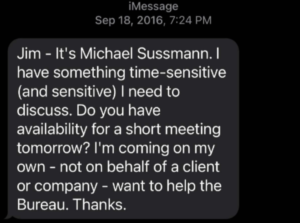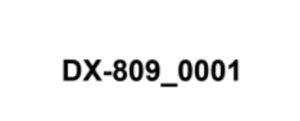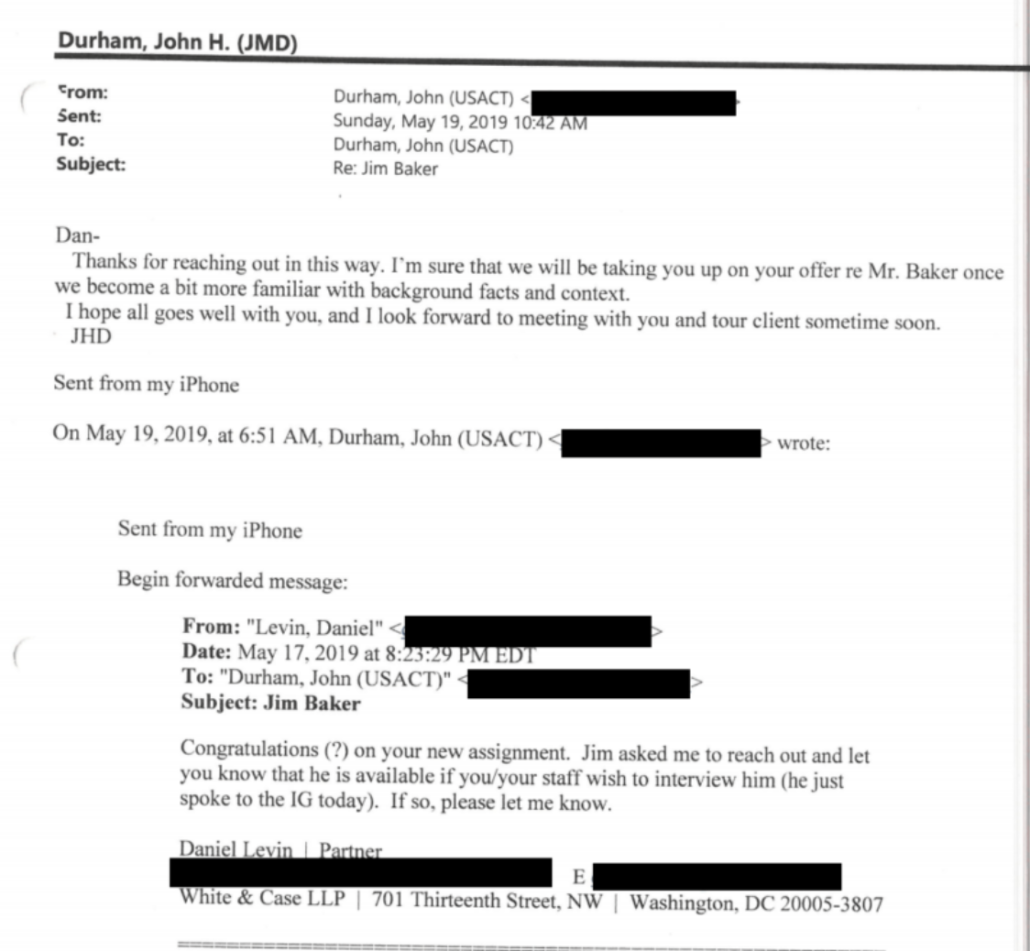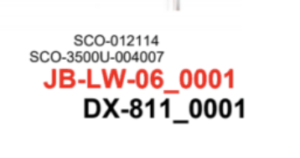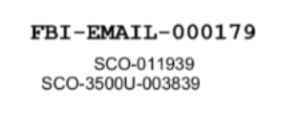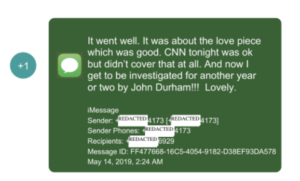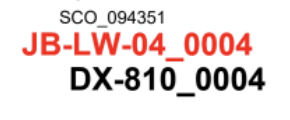Thanks to those who’ve donated to help defray the costs of trial transcripts. Your generosity has funded the expected costs of transcripts. But if you appreciate the kind of coverage no one else is offering, we’re still happy to accept donations. This coverage reflects the culmination of eight months work.
I’ve done a couple of posts showing how much fun one can have with Bates stamps — the serial numbers stamped onto every page of discovery that tells you a little bit about how any document was treated. In this post, for example, I showed that when John Durham accidentally-on-purpose released an exhibit with a bunch of Fusion GPS documents, he wasn’t doing so primarily to get them admitted at trial, because he had no intention of using most of them at trial. In this post, I showed that Durham hadn’t looked at key investigative documents that Michael Horowitz had relied upon in the Inspector General investigation into Crossfire Hurricane before Durham claimed he knew better than Horowitz about the predication of the Russian investigation. As of now, by the way, Horowitz is on the schedule to be a witness for Michael Sussmann. Ostensibly he’ll just talk about how valuable an anonymous tip that Sussmann once shared on behalf of Rodney Joffe proved to be, but who knows whether he’ll get a question about comments Durham has made about knowing better than Horowitz about things he hadn’t done the work to understand?
This post about Bates stamps won’t be so fun. It fills me with dread.
In this post and these two threads (Thursday night, Friday morning), I tried to summarize the Greek tragedy of Sussmann lawyer Sean Berkowitz’ cross-examination of Jim Baker. The short version of it is that these two men, men who used to be friends, are stuck in some nightmare Hunger Games created by a right wing mob led by Donald Trump. After years of being dragged through the mud because they dared to try to protect the United States from Russia in 2016, the survival of each depends on taking out the other. Jim Baker only avoids prosecution if he adheres obediently to John Durham’s internally contradictory script. Sussmann only gets his life back if he takes Baker out. While just Sussmann’s lawyer, Sean Berkowitz, and Jim Baker appear on this stage, it’s quite clear that Durham and DeFilippis set it.
Berkowitz started by quoting Baker’s explanation, from his earlier testimony, for why he had never searched his own files for texts with Sussmann.
Q. It’s your investigation, you said. I’m just here to answer the questions. Right? It’s Mr. DeFilippis’ investigation. You’re just here to answer the questions. Is what you said?
The context of that statement, from Andrew DeFilippis’ direct questioning of Baker, is crucial to understanding what follows.
The comment was Baker’s explanation to Durham’s lead prosecutor for why he only found a September 18, 2016 text from Michael Sussmann in March of 2022, almost six months after an entire indictment had been built around what Sussmann had said, instead, on September 19. As teed up by DeFilippis, Baker went looking for and found that text because Durham was just trying to comply with Jencks obligations, the requirement that prosecutors provide the prior statements of government witnesses in their possession to defendants.
Q. Are you familiar with the concept of Jencks materials or 3500 materials?
A. Yes.
[snip]
A. Correct. Yes. It’s an act of Congress that requires that — the reference to 3500 is a section in the U.S. Code.
Q. So did there come a time when you were asked by the Government to give any statements you might have on the subject of your testimony today?
A. Yes.
Q. And just tell us how that happened and then what you did in response.
A. There was a phone call with the Government. I think it was in March of this year. And it was to discuss discovery-related matters in part in the conversation. And I think it was Mr. Durham who asked me, you know: You need — we have an obligation to hand over discovery to the defense in this case. And can you go look for emails and other communications that you might have had with Mr. Sussmann?
And so in response to that, I — after we got off the phone, I immediately went to my phone and started looking through emails and then I looked for texts. And I did a search for texts with Michael’s last name; and texts came up, and I scrolled through them. They took a while to down — it was clear to me at least that they were downloading from the cloud.
And as I scrolled through and got to the beginning of my set of communications with Michael, this is the first one that I had.
Q. Now, had you — have you spoken to and met with the Government in connection with this case previously?
A. Yes.
Q. And had you previously located this text message here?
A. Not to the best of my recollection. No.
Q. What, if anything, was the reason for that?
A. It’s — I was not — I mean, the way I thought about it was that frankly, like, I am not out to get Michael. And this is not my investigation; this is your investigation. And so if you ask me a question, I answer it. If you ask me to look for something, I go look for it. But to the best of my recollection, nobody had asked me to go look for this material before that. [my emphasis]
Nobody had ever asked him to go look for evidence in his own possession related to the defendant against whom he was the key witness before, Baker testified. There’s a lot that’s unsaid — and batshit crazy — about this. One is that Durham only asked for communications directly with Sussmann, at least as Baker described events that happened just a few months ago.
Anyway, that was Durham’s explanation for how this text got shared with the government in March, six months after Durham had charged Sussmann for lying to hide what Durham imagines were Sussmann’s self-interests in a meeting with Baker on September 19, 2016. And by Baker’s telling, this belated request wasn’t just an example of DeFilippis trying to cover up his past incompetence (again). Durham was personally involved in this.
The only Bates stamp on this exhibit looks like this:
As you can see from Sussmann’s challenges to Durham’s exhibits submitted earlier this month, SCO-###### is one of two standard Bates stamps that Durham uses, the other being SC-########. Note both have a dash.
I knew as soon as I read the transcript that DeFilippis’ suggestion that this was about Jencks was intentionally misleading. Almost certainly, Durham found this text because they were still trying to comply with Sussmann’s demands, first made immediately after the indictment and then over and over after that, that prosecutors find the communications about Sussmann’s role in killing a NYT story that he knew must exist. Besides, Jencks is an obligation to turn over statements about an investigation in the government’s possession. These texts weren’t, until Durham asked for them, in the government’s possession.
I mean, I guess if they were, and Durham had been sitting on them for six months, then Durham has even bigger problems, which I don’t rule out.
That’s the background to the way Sussmann’s lawyer began his cross-examination. After reminding Baker of this statement, Berkowitz then laid out that, while Baker had met over ten times with Durham’s team, he had declined to meet with Sussmann’s team. Berkowitz introduced a letter he had sent Baker’s lawyer on April 20, asking to meet.
That letter had no Bates stamp. Just the Exhibit number submitting it into evidence.
That suggests Durham’s team hadn’t seen this letter yet — though I’m sure nothing about the letter was a surprise to them. Baker has met with Durham’s team at least twice since Berkowitz sent this letter. Berkowitz asked if Baker knew about the letter but Baker dodged, saying only that he had delegated the decision about meeting with Sussmann’s team to his lawyer, Dan Levin.
Then Berkowitz asked whether Baker knew what it was like to be under criminal investigation.
A. Yes.
Q. That’s Mr. Durham?
A. Yes.
They talked for a while about an earlier Durham investigation, one that lasted from 2017 until 2019 (Berkowitz made Baker repeat the dates), into whether information about surveillance that Baker had shared with a journalist had, or had not, been an authorized disclosure. Berkowitz talked about what might have happened had Baker been charged.
Loss of his legal career.
Being prosecuted.
Berkowitz talked about how that investigation basically boiled down to several conflicting versions of a phone call that other witnesses had given Durham. Their word against Baker’s.
Q. So at least one of their recollections was inconsistent with yours. Right?
A. Yes. Yes.
Q. Memories are a difficult thing, aren’t they, sir?
A. That’s a difficult question to answer. That depends.
That’s how Berkowitz prefaced the first of a long list of things Baker had said in Michael Sussmann’s trial that conflicted with things he had said in the past, a list that carried into a second day (actually Baker’s third day on the stand). At this point, Berkowitz mentioned just one of them — Baker’s inconsistent testimony to the Inspector General in July 2019 — then interrupted.
He put up a text to Ben Wittes that Baker sent the day after Durham was appointed in this matter (so weeks before that particular interview with the IG). Wittes and Baker were talking about TV appearances, but Baker seemed preoccupied by the Durham appointment.
MR. BERKOWITZ: The date, Mr. Cleaves.
THE WITNESS: There we go. Okay. Sorry. May 14th, 2019. Thank you.
BY MR. BERKOWITZ:
Q. And you write: “It went well. It was about the Love piece which was good. CNN Tonight was okay but didn’t cover that at all. And now I get to be investigated for another year or two by John Durham. Lovely.” Correct?
A. Right.
Q. So you expected to be investigated further by Mr. Durham. Correct?
A. Yes, I did.
I’ll come back to the metadata on the text in just a bit.
The text makes it clear how, after being investigated by John Durham from 2017 to 2019, upon learning that Durham had just been appointed to investigate other matters implicating Baker, FBI’s former General Counsel immediately realized the investigation would continue for another two years.
Baker was wrong about the timing. Durham’s investigation just celebrated its third birthday.
This text frames all of Baker’s subsequent cooperation in that light — in Baker’s immediate recognition that the hell he had been going through for the previous two years would continue another two. Or three. Or longer.
This is brilliant lawyering on Berkowitz’s part. But remember as you read along that this is really a Hunger Games conflict staged by Trump and Bill Barr to exploit the US Justice system to create a never-ending supply of revenge theater that will incite the base and lead the press to do shitty reporting for easy clicks. This is an act of revenge targeting anyone who has ever dared to question Trump’s corruption. Or even, question the dangers of Russian interference in American democracy.
Back to Berkowitz. After showing Baker the text reflecting his immediate dread about being investigated by Durham for two more years, Berkowitz described how, the day after Durham’s appointment (actually it was about three days after, and so two days after this text), Baker had his lawyer reach out to Durham and offer to cooperate.
The letter is actually kind of funny. It shows Levin emailing and saying, “Jim asked me to reach out and let you know that he is available if you wish to interview him (he just spoke to the IG today).” Durham seems to have forwarded that email from one of his DOJ emails to another. I sort of wonder if there was a BCC, because Durham was in really close contact with Bill Barr’s office in these weeks. Durham then attempted to write back to Levin but at least as it appears (because he forwarded the email to himself rather than simply replying with a CC to his second DOJ account), Durham simply wrote to himself, responding into a void about meeting with “tour client” soon.
The Bates stamp for this exhibit looks like this:
DX-811 is the exhibit number for this trial (DX shows that it is one of Sussmann’s exhibits, as opposed to one of the government’s).
LW-06_0001 may reflect Sussmann’s Latham & Watkins’ lawyers sharing their proposed exhibits with Durham and Judge Cooper before the trial.
SCO-012114 is the regular Bates stamp associated with Durham’s production to Sussmann. It’s part of the same series (though much earlier in) the Bates stamp of the text that Baker turned over to Durham on March 4. SCO dash ######.
And SCO-3500U-4007 seems to be a Bates stamp specifically tied to Jencks discovery, which as noted above is called Rule 3500. That’s a really handy Bates stamp because it may indicate what Durham is treating as Jencks discovery. It appears in other direct statements made by Durham’s witnesses about this investigation. The calendar entry for the September 19, 2016 meeting between Baker and Sussmann, for example, has one of those 3500 stamps.
The text that, DeFilippis suggested, Durham had only asked for out of a diligent desire to comply with Jencks obligations doesn’t have one of these 3500 Bates stamps. Here it is again, SCO dash ######.
Having shown those three documents — Berkowitz’s request for a meeting with Baker, Baker’s text to Wittes dreading two more years of investigation by Durham, and Levin’s letter to Durham immediately after his appointment offering to come in for an interview — Berkowitz then resumed talking about inconsistencies in Baker’s testimony. He alluded, briefly, to a sworn statement Baker made to the grand jury under questioning from DeFilippis about the role that the General Counsel would have in FBI investigations. Then, after going through what Baker’s current testimony is, Berkowitz asked,
Q. The fact that Mr. Sussmann stated specifically in his message that he was acting on his own and not for a client did not factor heavily into your decision to meet with him. Correct?
This statement is inconsistent with the testimony Baker gave on the stand. Baker disavowed it.
A. I disagree with that.
So Berkowitz did what’s known as “refreshing” a witness’ memory, first by reading him what the 302 memorializing an FBI interview said.
Q. All right. Do you remember speaking with these folks in March of this year — by these folks to be, correct for the record, the prosecution team, Mr. DeFilippis?
A. In March of this year, I spoke to them, yes.
Q. Okay. And in March of this year, is it not true that you told them you do not believe that the fact that Sussmann stated specifically in his texts that he was acting on his own and not for a client factored heavily into your decision to meet with Michael Sussmann the very next day. You told them that?
A. Can you repeat the first part of that again? Sorry.
Q. “Baker does not believe that the fact that Sussmann stated specifically in his text message that he was acting on his own and not for a client factored heavily into his decision to meet with Sussmann the very next day”?
Baker, perhaps realizing that this interview from a few months ago conflicts with the testimony he has just given, had forgotten the question.
A. So, I’m sorry. What’s your question?
Q. You told them that on March 4th of 2022.
Baker didn’t recall giving that conflicting testimony.
A. Sitting here today, I don’t recall telling them that.
Berkowitz offered to show him the proof: a 302 interview report that, unlike the meeting between Baker and Sussmann on September 19, 2016, actually documents what was said.
Q. Refresh your recollection to see the 302 of your meeting, sir?
A. Sure. I haven’t seen that 302 before.
This is an opportunity for Berkowitz to explain, as he did when he used one to refresh Scott Hellman’s memory earlier in the week, what a 302 is and how FBI always creates 302s for fact witnesses.
Q. All right. And to orient the jury is when an agent is present and take notes. Correct?
A. It’s a report of an interview.
Q. And when a witness is interviewed by the FBI, an agent is there to take notes, if it’s a fact witness, and put it into a report. Correct?
A. Correct.
Q. You didn’t do that with Mr. Sussmann. Right?
A. Correct.
Berkowitz asked Baker if he remembered making the statement on March 4. DeFilippis’ single witness to Sussmann’s alleged crime professed, for the second time in short order, not to remember something that happened just a few months ago.
Q. Does it refresh your recollection that, on March 4th of 2022, you told the FBI and Mr. DeFilippis that you didn’t believe the fact that Mr. Sussmann stated specifically in his text he was acting on his own and not for a client factored heavily into your decision to meet with Mr. Sussmann the next day?
A. I don’t recall making that statement sitting here today.
Q. And it’s your testimony
MR. BERKOWITZ: You can take that down.
BY MR. BERKOWITZ: Q. It’s your testimony that that’s not accurate. Correct?
A. It’s my testimony today that, as I think about it today, that that’s not accurate.
More than just forgetting what he said a few months ago, Baker is showing the jury how, if his current belief conflicts with a past one shared under threat of false statements charges, he’ll simply say his past truth is not the truth. Not accurate.
Then Baker thinks of something: the significance of the date.
A. Can I ask you a question? When was that 302? What was the date? What meeting or what interview was that pertaining to?
Q. There’s a lot of different meetings and interviews here. This one was a couple of months ago on March 4th of 2022 —
A. Okay.
Q. — in connection with your trial preparation for today.
A. That was the date that I found the text, yes.
Q. Okay. Did that change your recollections at all or —
Baker explains that discovering a text in which Sussmann had stated that he wasn’t asking for the September 19, 2016 meeting “on behalf of any client,” but wanted to help the FBI had upset him, suggesting that might explain why he gave testimony a few months ago that substantially differs from the testimony he gave on the stand.
A. Well it’s just it was a very — it was a very difficult day for me and it was a bit upsetting.
As a reminder, this day was not just a stressful one for Baker. While I can’t think of an evidentiary basis by which Sussmann could share this with the jury, after Baker found a text that greatly complicated Durham’s prosecution, Durham accused Sussmann of hiding evidence, a stance he was forced to drop after Sussmann obtained a subpoena on his own to disprove that accusation.
Anyway, after noting that Baker met with Durham in spite of the stress of having found the text, Berkowitz asked Baker, for the first time in this Hunger Games conflict, whether he was aware that it was a crime to lie to the FBI.
A. I know very well it’s a crime to make a false statement to the FBI if that’s what you are getting at. Whether they say it or not, I know it.
At that point, Berkowitz pulled out a white board and starting writing down the things that Baker was committing to believing were the truth. He started with “the elephant in the room,” the memory that, if the jury finds it shaky, will sink this entire prosecution.
Q. Let’s start with the elephant in the room. Sitting here today, what is your testimony about what Mr. Sussmann told you relative to clients?
A. At the meeting in person on the 19th of September?
Q. Yes.
A. Okay. My testimony is that he said that he was not there on behalf of any particular client or words to that effect.
Q. Oh, now it’s “words to that effect.” Okay.
DeFilippis objected.
He didn’t want Berkowitz to write this down, I’m sure, because any juror taking notes is going to write down exactly what Berkowitz writes down, thereby solidifying the points in their memory. That’s how my memory works anyway: If I write it down, I’m far more likely to remember it. People think I have a really good memory, but in actuality, I just write a lot more than most people.
DiFilippis probably also didn’t want Berkowitz to write this down because it’ll isolate the key claims that Baker has made, thereby making it easier for jurors to compare his currently operative statements with what he had said in the past. DeFilippis wanted just the court reporter to write this down, in a transcript that won’t ever be shared with the jury.
MR. DeFILIPPIS: Objection, Your Honor, we do have a court reporter.
THE COURT: Overruled.
Berkowitz walked Baker through his currently operative story for the following:
- What Sussmann said on September 19 about having a client
- Whether Baker knew Sussmann worked for Hillary that day
- How long the meeting was
- What Sussmann said about a news organization ready to publish a story
- Whether he identified any particular cyber experts
- Whether those experts — Steve Bellovin, Matt Blaze, and Susan Landau — had vouched for the data
- Whether Baker or Sussmann had taken notes
- Whether he had refused to share Sussmann’s name when Scott Hellman and an FBI administrative person named Jordan Kelly had come to obtain the materials, as Scott Hellman testified earlier in the week
That’s when they break for lunch. After lunch they go over Baker’s meeting with Bill Prietsap, his calls to get Eric Lichtblau’s name later in the week, and his foggy memory about the details from the the March 6, 2017 when the Alfa Bank allegation comes back up. I’m not sure whether this got written onto a white board or not (it sounds like Berkowitz had filled the white board before lunch).
Berkowitz then returned to the many times Baker had given conflicting testimony under oath, starting with his testimony before Congress.
Q. And when you gave voluntary information to Congress, you understood that you were under oath?
A. I don’t think I was under oath, but I understood that it’s a crime to make false statements to Congress.
Q. So you tried to be as careful as you could. Correct?
A. I tried to be as careful as I could in that environment, yes, sir.
Q. You tried to be as truthful as you could?
A. (No response)
Q. Tried to be as truthful as you could?
A. Yes, sir.
Berkowitz then went through and laid out how his prior testimony conflicts with what he’s just laid out on the whiteboard and after lunch.
Again, great lawyering, but the reason this is so dreadful is because this is precisely the kind of Hunger Games conflict that Reality TV show star Donald Trump uses to accrue power.
Berkowitz reminded Baker that his two appearances before Congress in October 2018 could be subject to false statement prosecution, his 2019 interview with the Inspector General (which Baker calls “the I.G. thing”), the two meetings with Durham at which Sussmann was raised in June 2020 (at such time as Trump and Barr were pressuring Durham for pre-election results). All potentially subject to prosecution as false statements or perjury.
Berkowitz ended the day by asking about threats, returning again to the possibility that any single one of these inconsistent statements — the most recent of which discussed thus far was on March 4, 2022, the statute of limitation for which would not expire until 2027 — could be charged as a false statement.
Q. Did they threaten you, sir, with anything — based on the fact that you had previously told folks under oath or subject to perjury — that you had said inconsistent things?
A. Mr. Durham and his team have never threatened me in any way.
Q. But you understood, sir, did you not, as a lawyer, that if you had said something that someone determined was false, under oath, or subject to perjury, you could be prosecuted. Correct?
I suspect that, by the end of the week, Berkowitz will argue that several of Durham’s witnesses have made more easily provable false statements — and more material — to the Special Counsel and others than Sussmann, but Durham is not choosing to prosecute the ones who tell the story he wants told, the story he chooses to refresh. Remember, there are at least three documents already introduced that Durham chose not to use to refresh Baker’s memory to something different than he delivered on the stand last week.
Which brings me back to DeFilippis’ excuse for finding a text that Sussmann was asking for but which Durham had never bothered to look for, and the inconsistent statement — that Sussmann’s notice that he was not there on behalf of any client had a big role in him taking the meeting — and Baker’s attribution of his now-inconsistent answer to stress.
Durham discovered on March 4 that Baker had relevant texts he never bothered to ask for in 16 months of investigation before he charged Sussmann. DeFilippis introduced that text by claiming prosecutors had discovered it by asking — John Durham asked himself, according to Baker — for Jencks material.
That text has no Bates stamp reflecting that it is Jencks material.
There’s something else about that text. It looks nothing like the text that Berkowitz entered describing Baker’s dread as he realized Durham was going to be investigating for two more years. Here’s the text Baker turned over in March, in response to Durham’s request for any communications involving Sussmann, but only communications involving Sussmann.
Here’s the text to Wittes expressing certainty that Durham would investigate him for two more years.
These are both iMessage texts! They look entirely different, though, because one is a screen cap turned over by Baker, and the other was obtained via legal process served on Apple (which is where all the extra metadata comes from).
More interesting still, however, is the Bates stamp on the set of texts involving Wittes. The Bates stamp on that text looks like this:
There’s the red stamp that, I’m guessing, is the stamp associated with a pre-trial proposed exhibit.
There’s the trial exhibit stamp, DX-810.
And then there’s a Bates stamp that does not match any Durham Bates stamp I’ve seen. SCO_######. Underscore, not dash.
Although this is a statement by a witness — the key witness!! — about this very investigation, there’s no Jencks stamp.
Mind you, the government only has to turn over statements about an investigation under Jencks if it is in their possession. So maybe this was never in their possession? If it was, it’d be a Jencks violation and Sussmann could ask to have the entirety of Baker’s testimony thrown out. All of it.
I have no idea where this text string comes from. Perhaps it came from an FBI Inspection Division investigation of all these same people; such material was among the stuff that Durham was permitted to turn over late. Perhaps, as Latham & Watkins did when Durham accused Sussmann of hiding this text, they got a subpoena and obtained it themselves. But it appears, at least, that it didn’t come from Durham.
If that’s right — if, even after discovering that Baker had texts that were absolutely critical to this investigation that he had never turned over, Durham didn’t choose to obtain these texts directly from Apple themselves, or at the very least ask Baker to turn over all texts pertinent to his investigation — there are several implications. First, it’s proof that Durham never ever subjected Baker, the guy who offered to cooperate on day three, to investigative scrutiny for his role in the events from September 19, 2016 that Durham has chosen to criminalize. Nor has Durham tested what might be behind any of Baker’s subsequent inconsistent statements. And when Durham discovered that Baker had had texts that were critical to his investigation almost three years into the investigation, his first response was to attempt to blame Sussmann. When that didn’t work, it appears, Durham didn’t put his prosecution at risk to see what other texts, texts that might be critical to Durham’s investigation but which didn’t involve communications between him and Sussmann, might be in Baker’s iCloud account.
This is brilliant lawyering. But it’s all just a part of Donald Trump’s Hunger Games, revenge theater targeting the people who questioned his complicit ties with Russia. And the wrong people are going to get hurt.
Other Sussmann trial coverage
Scene-Setter for the Sussmann Trial, Part One: The Elements of the Offense
Scene-Setter for the Sussmann Trial, Part Two: The Witnesses
With a Much-Anticipated Fusion GPS Witness, Andrew DeFilippis Bangs the Table
John Durham’s Lies with Metadata
emptywheel’s Continuing Obsession with Sticky Notes, Michael Sussmann Trial Edition
Brittain Shaw’s Privileged Attempt to Misrepresent Eric Lichtblau’s Privilege
The Methodology of Andrew DeFilippis’ Elaborate Plot to Break Judge Cooper’s Rules
Jim Baker’s Tweet and the Recidivist Foreign Influence Cheater
That Clinton Tweet Could Lead To a Mistrial (or Reversal on Appeal)
John Durham Is Prosecuting Michael Sussmann for Sharing a Tip on Now-Sanctioned Alfa Bank
